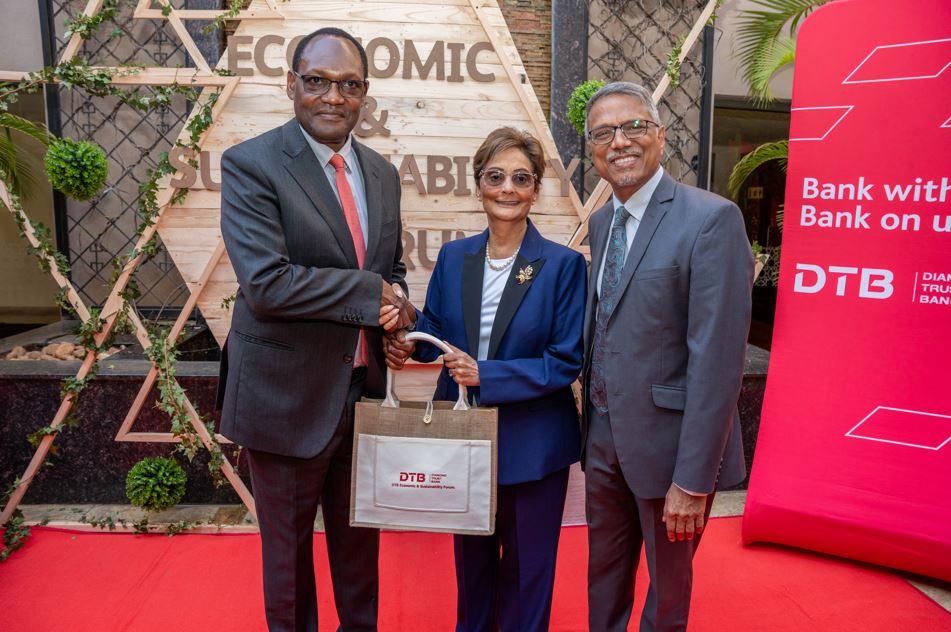Economy recovery to double lending to small businesses, experts say

The Central Bank of Kenya (CBK) early this month scaled down its base lending rate by 0.5 per cent to 10.75 per cent.
After about the past two years of tight lending conditions, individuals and small businesses can finally breathe a sigh of relief, as experts predict an increase in access to credit in the coming years.
Speaking on Thursday during Diamond Trust Bank's (DTB) economic and sustainability forum in Nairobi, financial experts predicted that credit availability could almost double current levels, thanks to the easing interest rates and the general upturn of the economy.
More To Read
- Kenyans to access cheaper loans as CBK cuts lending rate to 9.25 per cent
- Banks urge CBK to cut base rate to spur private sector lending
- CBK revises credit pricing model, adopts new benchmark rate for loan pricing
- Kindiki welcomes CBK lending rate cut, says economy on recovery path
- Kenyan banks tighten oversight of third-party tech firms amid rising cyber threats
- Mang’eni urges Kenyan MSMEs to embrace technology, formalise for global growth
DTB Kenya CEO, Murali Natarajan, said if the current momentum continues, the banking sector's credit is expected to double over the next decade, growing from the current $32 billion (Sh4.14 trillion).
"The immediate impact will be felt by individuals and small businesses," Natarajan said.
"When I look at the resilience of the economy and the track record of having dealt with so many challenges, that gives me immense confidence about going forward."
Additionally, he noted that as banks start focusing on retail and SMEs, there exists a big growth opportunity.
"We are pretty confident that focusing on the segments, like agriculture, retail, MSME, we should be able to double our balance sheet in about three to four years," Natarajan said.
His forecast is supported by the stability of the Kenyan economy following interventions to reduce interest rates, the effect of plentiful rains and the reduction of fuel prices.
The macros look stable, interest rates are coming down, and the flow of remittances from Kenyans abroad continues, Natarajan added in part.
Base lending rate
The Central Bank of Kenya (CBK) early this month scaled down its base lending rate by 0.5 per cent to 10.75 per cent in what it said is anchored on enhancing the flow of credit to the private sector and reducing borrowing costs.
It marked the fourth consecutive time the benchmark policy rate was lowered from the historic high of 13 per cent.
Consequently, several banks across the country have also complied with the directive, adjusting their rates to align with the CBK's benchmark rate.
This is arguably a welcome shift for many who have faced financial constraints, especially during the recent economic downturns.
Also speaking during the forum, National Treasury Principal Secretary Chris Kiptoo echoed the positive credit environment prospect, saying the worst is over for borrowers and the economy.
He said the country has successfully navigated past its most significant shocks and has emerged with a more resilient economic foundation with financial institutions now better positioned to support growth.
"When I started, it was very hard, and I had many sleepless nights. Now the worst is over, and the future is brighter. We have a resilient economy, diversified and that's how we come out of shocks," Kiptoo said.
Credit Guarantee Scheme
To boost lending to the private sector, the PS highlighted that the Credit Guarantee Scheme would be transferred to a government-owned company to keep it going.
The Credit Guarantee is an arrangement between the government and seven banks where the government commits to pay a portion of the outstanding amount in the case of a default.
He further noted that the committee verifying pending bills has so far approved the payout of Sh236 billion of the more than Sh600 billion when the Kenya Kwanza administration took over.
Of this, the bulk would go to small businesses that are suppliers and to road contractors.
Nevertheless, he maintained a brave face that the current momentum will continue.
On the general economic prospect, the National Treasury in the draft 2025 Budget Policy Statement projects the country's economy to grow by 5.3 percent this year.
This is from 4.6 per cent in the previous year.
According to the exchequer, the economy is expected to retain the same momentum over the medium term, largely driven by enhanced agricultural productivity and a resilient services sector.
Notably, Kenya's private sector loan growth reportedly hit a record low in 2024, slowing to just four per cent, the lowest in recent years.
Official data shows the total amount of money circulating in the economy dropped by half, marking a significant downturn in Kenya's financial sector.
Credit growth, which had previously been at 12.2 per cent in the previous financial year, dipped to a mere four per cent, representing a total of Sh3.8 trillion.
This marked the third consecutive year of decline in private-sector credit growth.
Top Stories Today














































